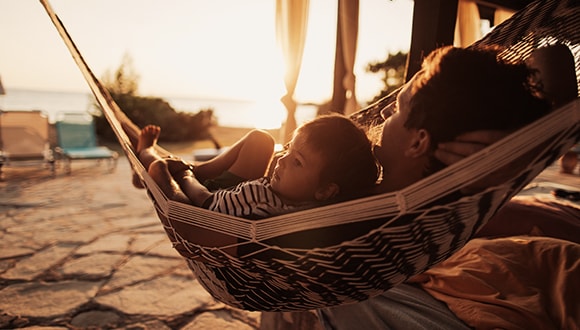Why do you get sick when you take a break?
Do you get ill the moment you take a break from work or your normal routine? You might be experiencing ‘leisure sickness’. Here’s how to lower your risk.
Helen Foster
December 2018
It’s the first day of your longed-for holiday and suddenly you come down with a sore throat or feel fatigued. While it may feel like the universe is conspiring against you, it’s actually a common scenario, known as leisure sickness.
Dutch psychologist Professor Ad Vingerhoets, who coined the phrase ‘leisure sickness’ and was the first to study it, surveyed almost 2,000 Dutch people and found around 3% of them reported getting colds and flu or having niggles such as headaches, fatigue or nausea when they took a break from work.

Why do I get leisure sickness?
Prof Vingerhoets isn’t exactly sure why leisure sickness happens, but the research did find people who were overly focused on their jobs to be more vulnerable. They found it difficult to transition between work and time off, were high achievers, and had a strong sense of responsibility when it came to their work.
Stress also appeared to be a factor, with some participants acknowledging they were struggling to manage their stress in the build up to their break. One of Prof Vingerhoets’ theories is that acute stress may hold off illness. And when we relax on holiday our resistance to disease is lowered and we can get sick.
Another area that Prof Vingerhoets would like to see researched further is the idea of mind over matter. In other words, do some people have the power to postpone their illness to a more appropriate time? For example, several reports mentioned in Prof Vingerhoets’ study indicate that people can, in some cases, postpone their death until after a personally significant event has passed, like a family wedding.
Reduce your risk of leisure sickness
1. Try to keep stress at bay
The number 1 thing you can do to reduce your risk of becoming ill on holiday is to decrease your stress before you go away. Prioritise what you need to complete before you go and focus on that rather than trying to do everything on an impossibly long to-do list.
If you can, organise a calm start to your journey: book a preferred seat in advance, check in online, or arrange transport to the airport or station so you arrive in plenty of time.
2. Keep up your healthy habits
Trying to get everything done before you leave might also mean you neglect your healthy routine. This could be relying more on takeaway food, which tends to be packed with sugar or fat, or skipping exercise. Both can negatively affect immunity.
“Try and maintain exercise and eating patterns before your holiday – and in the few days once you get there,” says Associate Professor Thomas Buckley, who studies the link between work stress and health at the University of Sydney. This will help your body adjust “from a pre-vacation stressed and rushed state and promote better immune function”.
3. Maintain hygiene when travelling
Coming into contact with a large number of people in a confined space can increase your risk of getting ill, so if you’re travelling on a train or plane simple hygiene is recommended.
“Washing your hands frequently as you travel will help reduce exposure to bacteria,” says Dr Buckley.
If possible, choose a window seat when flying. When US researchers looked at how many people passengers encountered on a flight, those in an aisle seat had close contact with 64 people while those in the window only had contact with 12 people.
4. Transition from rushed to relaxed
The type of holiday you choose can depend on your circumstances and preferences. If you’re more likely to book a relaxing, inactive holiday, consider planning some activities such as sightseeing, a yoga class or a cooking class.
In Prof Vingerhoets’ survey, the group that experienced leisure sickness were more likely to say they found it hard to adjust to not being busy.
“Rest and relaxation might be associated with feelings of guilt which can also be a source of stress,” he says.
Leisure sickness can be “a clear signal from your body that you need to go somewhat easier on your work, and strive for more balance in your life,” says Prof Vingerhoets.
Related articles
HOW CAN WE REDUCE THE SPREAD OF THE FLU?
Don’t want to share your bug? Here’s how to protect those around you.
STAYING HEALTHY ON HOLIDAYS
From food safety to travel vaccinations, here’s how to have a happy, healthy holiday.
WEEKEND REBOOT: STAYING HEALTHY IN YOUR DOWNTIME
Tips for less booze and more bounce on your weekends.
HOW TO SURVIVE THE FESTIVE SEASON
'Tis the season to be jolly. Or is it? With families coming together, financial pressure and expectations rising, for some the holidays can be anything but a happy time.